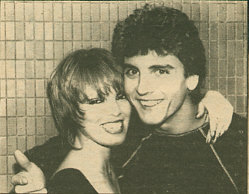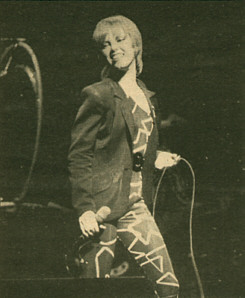

For the next forty
minutes, Benatar’s guitarist/fiancé/advisor (and Cleveland product) Giraldo
sequestered himself in the next room to watch the game, and Benatar chatted affably about
her career in between sips of tea. An alert and candid conversationalist, she interrupted
herself only once, to betray her New
York roots by announcing she’d spotted a brown cockroach crawling up the room’s
brown dresser at a distance of ten feet (“When I first moved out of the city, we had
little spots in the design of the counter of our new place, and if I would move my eyes
fast I’d swear I saw one move”). A genuine talent for whom everything seems to
be going right, Benatar talked freely about the joys and the incongruities of rock and
womanhood.
SCENE: You said in a recent interview that you’re
really not cut out to be a star. Yet you are a star, or practically so. How do you reconcile
that?
PB:
Now that it’s beginning to happen, I don’t know what to do about it. I guess I’ll have to find a way. This
second record especially was like real quick- like gold in 13
days quick. You get real scared real fast. I think in a little bit I’ll slow down. I
was just talking to my manager the other day and told him I thought my whole problem is
that I think I can have anything I want and then I get it.
SCENE: Is the dream beginning to fade yet?
PB: I don’t think you ever get tired of it. You
get tired of the bullshit part of it. The work part of it tends to tarnish the dream part of it. When
you go on to play, though, that seems to rectify anything that went on all day. You forget
about it. You can be so mad when you go
onstage, and by the time it’s done, everything is so smooth. It really isn’t
anything except pressure, and that goes away.
SCENE: Did your
efforts to get Chrysalis to stop pushing your sex kitten image make you feel that control
of your career had slipped out of your hands?
PB: I always feel that you know best what’s going
to hurt you in the long run. You do what you can, it’s a big
corporation, and you’re just a little person,
but you have a lot of power. If you just use it right and don’t go overboard, people
are pretty cooperative. When Chrysalis found out what they were doing was really upsetting
me, they put a lid on it. You won’t ever see these kinds of things again (gestures to
pert ballet poster). They thought I wanted
that, so they did it. They won’t totally stop, ‘cause they’re not stupid.
They know it sells records. But they promised to compromise.
SCENE: How come there’s all kinds of ways to market
a male artist, but the marketing of women always seems to, make their femininity an issue?
PB: That’s just the way society is. I’m
really in favor of everybody being equal, but I know they never will be. It’s
been
too long. Maybe it will level out a little. They put you into stereotypes, and rather than
me be the Patti Smith stereotype, they decided it was better to go the other way, it was
more saleable and believable than trying to make me look like a guy.
SCENE: It must be frustrating to be forced into such a confining
role.
PB: It’s a pain in the ass, is what it is. When
you begin it never enters your mind. You don’t realize that when you put your leg up
on a speaker people go wild. And then when people make you aware of it, it makes you inhibited; afraid to do it, because that’s never what
you intended. So I found out I became real inhibited, and right now I’m trying to
stop being that way.
SCENE: It can probably be more like bouncing from side to side than steering
straight down the middle.
PB: That’s it exactly.
 SCENE: Do you think women rockers are finally coming into
their own?
SCENE: Do you think women rockers are finally coming into
their own?
PB: From my point of view, they’ve always been
there. Janis Joplin did it; those girl groups
did it.
It’s
just in the last ten years there’s been a drought, but I think the cycle’s come
back around. I don’t know if it’s already passed again, and no more new people
will come out. I don’t know if we did the year and now it’s gone and all the new
ones are not gonna happen. That would be a shame. It basically depends upon material, and
how you put it across. If you don’t have good songs, and you’re a great singer
and you look great or bad or whatever, you won’t make it.
PB: I like Chrissie Hynde of the Pretenders a lot,
because she is the harder side of me. She’s like real left of me. I wouldn’t
ever wanna do that, because I prefer to stay this side, but I’m glad that somebody
did it.
I like
her songs, I think she’s a really good writer.
SCENE: To me, your style and Hynde’s are direct opposites: you were
trained classically, by the book, and she’s so earthy and self-taught. Do you think
you might envy her naturalness?
SCENE: Is a smash debut album a scary thing to follow?
SCENE: You wouldn’t be a perfectionist, would you?
PB: To a point. Neil is
too.
He’s nuts; we’ve recut whole songs again and again. You’re all tense, and
nobody knows what they’re doing. You
really do, but you’re so much more afraid and nervous.
Neil was really cool, he was at the helm;
he was saying, “Don’t worry;
everything is fine; it’s
gonna be great” and I’m going, “It’s gonna be shit!” I was really scared.
SCENE: Do you feel better about it now?
PB: Yes. I’m one of those Monday morning
quarterbacks. I’ll wait until people say they like it and then I’ll like it. The one thing I did
like about it right from the beginning was... I didn’t know if it was gonna be good or
bad, popular, but I thought it was
much more like we are really. You know, it was a better example
of what the band was about. I just didn’t know if it was gonna do well.
SCENE: How much of you was concerned with pleasing yourself, and how much with pleasing the public?
PB: Probably about 75/25. I think you mostly always
try to please yourself and pray that they like it too. I’d think
about it,
but I
would never change anything to make ‘em like it.
SCENE: So then why weren’t you-sure about how you felt about it until you saw others’ reactions?
PB: It’s a terrible-thing. To me, it’s so
obvious. It’s just that a lot of times people can be so narrow-sighted about things,
thinking, “It’s her name; it must be her thing.” That’s not true at all; I do so little of everything. When you see us on stage, you
can see that it’s a band. It always was
a band. No one knew, though, when it began that
that’s how it would be—
including us. That’s what I wanted, but I didn’t
know if that’s what was gonna happen because I’ve played with side people for so
long and nothing ever came together, people had such egos and they were assholes. But this
band just went right together immediately. It was great, because it wasn’t left up to
me to do everything. I couldn’t anyway. I mean, to hold a whole
show by yourself is like.. it’s horrible. It’s much more fun to have people to
play with up there.
SCENE: Do you like to tour?
SCENE: That’s
an interesting point.
PB: Thankfully, at least I have my man here, and
that’s easier. I can’t imagine what it would be like to be a single-woman on the
road... I think you’d be slitting your wrists a lot of times and be crazy.
There’s no people that you’d wanna meet. A man can be a little more callous
toward that sort of thing.
It’s great to
go all over the entire country, though. And playing makes up for all the hassles. When people say,
“Your record’s no. 6,” it’s like: “oh great; who cares?” But to go out and see throngs of people... I don’t think you realize it ‘til you see
them and know they’re there, and they’re really coming.
PB: It’s pretty difficult. You know that under
normal circumstances, everything would be very easy. But you’re forced into a
situation where you’re together 24 hours a day.
SCENE: Most people don’t care to be together that much.
Because you’re
human, you fail a lot. But it’s something that’s worthwhile, because you know
that’s more important than any of this. So you work at it, because you know
that if it’s really right, ten years from now you’ll still be there. This may
not.
Cleveland Scene, October 16-22, 1980.